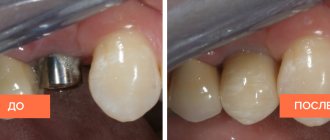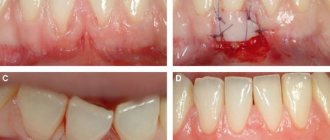Home / Complaints, courts, consumer rights / Services and consumer protection
Back
Published: September 30, 2018
Reading time: 6 min
4
921
Installing a filling on a tooth or prosthetics are the most popular dental services in Russia. Before dental interventions, it is worth clarifying what warranty period applies to the filling or prosthesis.
- Legal standards
- Warranty period for dental services
- Types of warranty obligations
- In what cases and how are dentures and fillings repaired or replaced under warranty?
During this period, the client of the dental clinic has the right to have defects eliminated free of charge.
What is the difference between the obligations of a company and dentistry?
The implantation guarantee consists of two components:
- warranty provided by the manufacturer for the titanium implant;
- guarantee for the implantation procedure from the dental clinic.
To determine the actual service life, let’s consider how the clinic’s warranty differs from the service life established by the manufacturer.
How many years does the warranty last for implants? Is there a lifetime warranty?
Each dental implant manufacturing company provides an official guarantee for the product. Thus, the manufacturer promises that the implant will retain its shape and functionality throughout the specified period.
- Premium implants come with a lifetime warranty.
- The warranty period for mid-segment designs ranges from 10 to 25 years.
- Economy class systems have a 10-15 year warranty.
A middle-class implant can last a lifetime, but a premium system can cause complications after a short period of time.
If the implant breaks or is defective, the manufacturer will replace it. Usually, for a technical defect to make itself felt, one year is enough. If the breakdown occurred due to the fault of the patient or doctor, replacement is not performed.
What are the obligations of the clinic during implantation?
The second form of guarantee is provided by the dental clinic and does not exceed 12-24 months . Medical institutions determine warranty periods independently. The clinic's guarantee only applies to the installation of a titanium support. As a rule, it is in the first 2 years that the risk of implant rejection is especially high, the reason for this is a violation of the implantation technology.
According to statistics, most complications after implantation in the early period are due to medical negligence or inexperience. The reason for non-survival may be insufficient sterility of the instruments, an incorrectly selected implant, or rough preparation with a bur.
If the implant is rejected after 3-5 years, then other reasons beyond the doctor’s control contribute to this. For example, insufficient hygiene or systemic diseases. Therefore, the doctor is not obliged to extend the guarantee for a longer period.
In practice, the patient cannot always obtain compensation in case of rejection. It is difficult to prove a doctor’s guilt, and not everyone is able to independently admit and correct their mistake.
Can a denture last as long as a dental implant?
The service life of an artificial crown directly depends on the material from which it is made. have the shortest service life - 2-3 years . Plastic is a brittle material that can crack over time under the pressure of chewing pressure. The porous surface structure quickly lends itself to pigmentation, becomes clogged with food debris and becomes a breeding ground for bacteria.
Metal-ceramic crowns are stronger and more durable and will last at least 10 years . Under extremely high chewing loads, the ceramic surface may chip, but if you avoid hard foods, the crown will not lose functionality until the end of the specified period.
The most durable, strong and hypoallergenic crowns are made from zirconium dioxide . Their service life is equal to that of a titanium root and is at least 15 years .
If an artificial crown breaks, there is no need to remove the implant. Only a new crown is made and attached.
Execution of consumer rights
Whether consumer rights are enforced depends on the clients. Remember - it is always important to read the contract for the service provided. It spells out all the nuances of receiving the service, as well as how long the warranty period will last. But besides this, we’ll talk about which actions in which situation are more rational to perform in order to get the maximum result and spend less time.
Replacement according to warranty terms
Most often, after the doctor has treated the tooth, after some time the filling or part of it falls out. If the warranty is still valid, it is best to contact the same dentist where you were treated before. The sequence of actions is as follows:
- call the reception desk and make an appointment with a doctor (tell us what happened);
- When you come to your appointment, take the contract and check with you (they should remind you of this at the reception, but this does not always happen);
- the doctor examines the filling and makes a verdict - whether this is a warranty case or not;
- if the doctor’s answer is not satisfactory, you can conduct an independent examination and even have the tooth treated by another doctor;
- bring the results of the examination to the dentistry, and also provide an invoice for the work performed so that the clinic compensates for losses.
Sometimes even the presence of an expert's opinion does not help. In this case, it is advisable to consult with a lawyer to develop a plan for further action. For example, make a claim or even send a lawsuit to court, which is especially important if the amount for poor-quality treatment was quite large or the specialists caused harm to health.
When does the warranty stop working?
Clinics may not operate under warranty in the following cases:
- If the patient ignored oral hygiene procedures. This item includes not only regular brushing of teeth, but also various rinses, ointments and gels. But only if the recovery period included the use of the funds in question, and this was recorded in the patient’s card.
- If someone else touched the filling. For example, after going to the dentist, a few days later the client went to another doctor, who, while treating a neighboring tooth, touched a controversial tooth (for example, he filed it a little).
- An influence of indefinable force was exerted. In particular, the client had an accident or fell, and because of this he knocked out/broke a tooth. Naturally, the doctor is not to blame for this and the patient has no right to demand compensation.
In addition, some types of fillings are not covered by guarantees at all. For example, this applies to temporary options.
What determines successful engraftment and exploitation?
- Professionalism of the implantologist and orthopedist;
- implant quality;
- degree of fixation of the rod with the superstructure;
- compliance with operating and hygiene rules;
- patient's health status.
- Complete restoration of the dentition in just 4 days!
more detailsRoott Pterygoid Implants Sinus lift is no longer needed!
more details
Once and for life! Express implantation in 4 days with a permanent ReSmile prosthesis
more details
All-on-4, All-on-6, ReSmile, Zygomatic implantation We use all modern methods of dentition restoration
more details
Often, after complete tissue healing and prosthetics, patients begin to underestimate the importance of oral hygiene. Caries cannot form on artificial crowns, but dentures are no less susceptible to plaque deposits than natural teeth. Deposits lead to inflammation of the mucous membrane, which can provoke peri-implantitis and root rejection.
Each case is individual, and the actual service life depends both on the patient’s health condition and on the professionalism of the doctor.
Indications/contraindications
Implantation is carried out exclusively according to indications. The need to install artificial roots is determined by the dentist who examines the patient at the first appointment.
The need for implantation is confirmed in the following indications:
- missing one tooth;
- absence of 2 or more dental organs, with adjacent location;
- absence of the last teeth without the possibility of restoration by other methods;
- complete edentia (congenital pathology characterized by the absence of teeth);
- the presence of reasons preventing the wearing of a removable denture (for example, a gag reflex);
- pain caused by functional occlusion;
- absence of alveolar processes in the upper jaw with concomitant complete absence of teeth;
- anatomical defects that arise as a result of diseases, mechanical effects, as well as as a result of disturbances during intrauterine development or genetic predisposition.
In professional dentistry, the patient is additionally sent for diagnostics to determine contraindications:
- severe diseases of the cardiovascular system;
- malignant oncological diseases;
- diseases of the nervous system;
- blood pathologies (especially poor clotting);
- severe connective tissue diseases;
- open tuberculosis;
- liver/renal failure during exacerbation;
- increased tone of the masticatory muscles in combination with bruxism;
- diabetes mellitus;
- immunodeficiency diseases;
- allergic reaction to painkillers;
- age up to 18 - 22 years (depending on indications);
- addiction to drugs or alcohol.
If a patient undergoes implantation with contraindications, the shelf life of dental implants will be reduced to 1 - 2 months, or even several days. In case of contraindications, 90% of patients experience rejection of the structure with the development of associated complications.
Criteria for choosing a specialist and clinic
- It is necessary for the doctor to have a license to perform implantation and permission from the SES;
- it is important that the surgeon has extensive work experience and a positive track record;
- the doctor must provide diplomas, certificates and certificates of specialization;
- the clinic must be equipped with all necessary diagnostic and surgical equipment.
You can install implants with a clinic guarantee of up to 10 years at Dantistoff Scientific Dentistry. Doctors - candidates and doctors of science. Sign up.
A few words about the service book
The service book is a kind of “implantation passport”; it contains detailed information about the implants, about the repair of prostheses, and about the examinations performed. The document is kept by the patient and should be taken with you every time you visit an implantologist or orthopedic dentist.
“After installing the implants in the first year, I probably visited the doctor 3-4 times. And before the visit, the girls from the clinic called me and reminded me to remember to take the patient’s book with me. Then I started going less often, about once every six months or a year. And I also took it with me, the doctor makes notes in it. Otherwise, you might void the warranty. It’s like with a car - we go through a technical inspection, take the warranty with us so that they can put a mark in the service department.”
Olesya G., review from the site irecommend.ru
In what cases is it canceled?
In case of violation of which obligations the patient may lose the guarantee if:
- Neglect of preventive examinations. If the patient did not visit the clinic, the blame for unsuccessful engraftment will fall on him. The doctor could diagnose and stop the inflammatory process at an early stage.
- The surgical and orthopedic stages of treatment were carried out in different clinics. If complications arise, no doctor wants to take the blame from his colleague. And the patient himself will have to figure out for a long time whose fault it was that the problems started.
- The patient did not comply with the medication regimen or the rules for caring for the prosthesis.
- He hid from the doctor chronic diseases or other contraindications that led to implant rejection.
- The patient smoked during the post-implantation period.
Individual warranty periods
In some cases, the warranty period can be determined by the dentist-implantologist individually for each patient - if for some reason it is impossible to give an accurate prognosis for implantation. Let's look at them in more detail:
- the patient has been diagnosed with an acute form of periodontal disease or periodontitis,
- the mouth contains teeth with a high degree of mobility,
- the patient has been diagnosed with diabetes mellitus, osteoporosis, cancer, rheumatism, HIV infection, etc.,
- the patient engages in dangerous sports, works in hazardous work,
- in smoking patients, as well as people with other addiction syndromes.
Such reasons can lead to complications1 - poor implant survival, increase the risk of postoperative inflammatory processes of the gums and bones, as well as injuries and rejections.
Why don’t dentists provide a guarantee for implantation and when is the product replaced?
Alexey Viktorovich, maxillofacial surgeon
You often hear the following advertising slogans: “100% guarantee on dental implants!”, “Warranty on implants for 20-30-40 years!” and others. To be honest, no doctor can give a 100% guarantee for any surgical procedure. Whether it's a sinus lift, osteoplasty or dental implantation. The doctor can create favorable conditions, and the positive outcome of the operation is the merit of the body. Even the simplest tooth extraction procedure has small risks of complications.
I know of one case where MIS Corporation actually replaced a defective implant. But if a patient rarely brushes his teeth or chews nuts every day, it’s his own fault.
The bottom line is this: a lifetime guarantee is a promise that the implant will not fail, not that it will not fall out due to peri-implantitis in 5 years.
Insurance for implantation
Dental implantation in our country is not included in the compulsory health insurance program; it is carried out for a fee. And many patients want to receive not only a guarantee from the clinic for work, implants or prostheses, but also additional life and health insurance. Some dentists practice this approach and enter into contracts with large insurance companies, which will further protect the patient in case of unforeseen situations. To receive the most complete protection - for example, from non-guarantee situations, any person can enter into a VHI agreement (additional health insurance) with a company providing such a service.
1Frome S., Complications of dental implantation: etiology, prevention and treatment, 2022.
Author: Namdakov N.V. (Thank you for your help in writing the article and the information provided)
Cost in Moscow
| Implantation with a lifetime guarantee on the implant | Cost, rub. |
| Osstem | |
| With metal-ceramic crown | 43000 |
| With zirconium crown | 65000 |
| Astra Tech | |
| With metal-ceramic crown | 64000 |
| With zirconium crown | 74000 |
| Nobel Biocare | |
| With metal-ceramic crown | 65000 |
| With zirconium crown | 80000 |
| Straumann | |
| With metal-ceramic crown | 77000 |
| With zirconium crown | 90000 |
| Installation with a guarantee of 10 to 25 years for the implant | Cost, rub. |
| Alpha Bio | |
| With metal-ceramic crown | 38000 |
| With zirconium crown | 50000 |
| M.I.S. | |
| With metal-ceramic crown | 40000 |
| With zirconium crown | 50000 |
When to change
After implantation, you should visit your dentist every 6 months. As soon as a specialist detects signs of product rejection or sees that the design no longer meets quality requirements, a decision is made to remove and possibly replace the structure.
Changing the implant is necessary if:
- pin mobility;
- severe pain at the attachment site;
- bleeding;
- severe swelling;
- signs of suppuration;
- swelling of the face in the area of implant installation.
If the patient himself notices such signs, then he should contact a specialist immediately. Similar symptoms can occur both in the first days and years later.
Will the prosthesis last as long as an implant?
All types of crowns and dentures require replacement after a certain period. However, it is possible that with proper and careful care they will last you a lifetime.
Important! Replacing a prosthesis does not entail replacing an implant. The abutment may need to be replaced if the new crown has a different design shape.
Service life of prostheses:
- Metal ceramics – 10–12 years
- Zirconium oxide – from 20 years
Important Factors
Before placing an implant, it is important to prepare the oral cavity for surgery. To do this, a specialist carries out professional cleaning of the teeth, removes tartar and plaque. If there is a deficiency of bone tissue, bone augmentation is carried out. During the operation, an important condition is the professionalism and experience of a specialist - an implantologist and an orthopedic dentist. An experienced specialist should carry out the following activities before implanting the implant and after the operation:
- correctly select the design and its size;
- eliminate foci of the infectious process - cysts, granulomas;
- will carry out competent sanitation of the oral cavity, including sanitation of the socket of an extracted tooth;
- determine the volume and density of bones;
- will prevent increased load on the implant;
- will not allow excessive overheating of the bone during preparation;
- applies high-quality sutures;
- will give the correct recommendations after installing the product.
If all rules are followed, the structure will last much longer.











